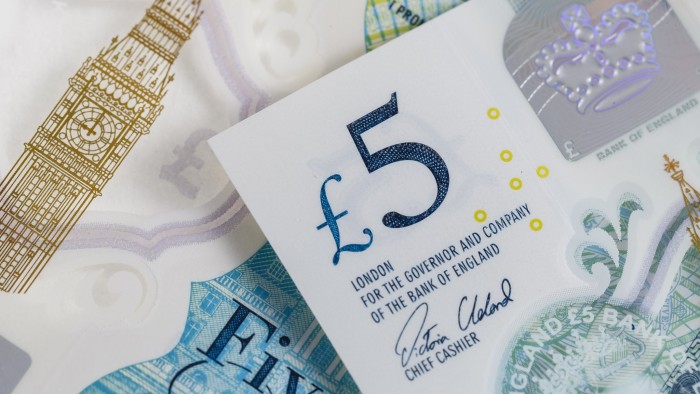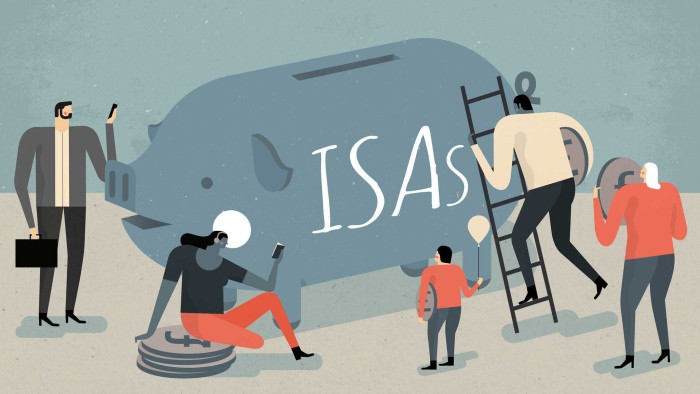The best and worst rates on cash Isas

Roula Khalaf, Editor of the FT, selects her favourite stories in this weekly newsletter.
The biggest conundrum in personal finance is about to become even more perplexing.
Cash Isas have attracted billions of pounds in savings in the past decade, even as their interest rates have fallen and investments in their stock market-based counterparts have seen their value steadily climb. Over the 10 years to 2016, the proportion of Isa subscriptions accounted for by cash — versus stocks and shares — has hovered around 80 per cent.
Investors can choose to split their annual Isa allowance of £15,240 between cash and stocks and shares products, rising to £20,000 from April 6. Yet the returns cash Isas offer have plumbed new depths in the past year. In February 2016, the average rate on an easy access Isa was a paltry 1.19 per cent. Today, after a cut in Bank of England base rates in August, it is scraping 0.64 per cent, according to finance website Moneyfacts.
The bad news for cash Isas is set to get worse. As inflation picks up, interest rates will struggle to keep pace with rising prices — meaning the value of your savings will fall in real terms.
“If you’re sitting on cash Isas with derisory interest rates, it’s low risk, but with inflation on the rise its real value is going to get eroded over time,” said Jason Hollands, managing director of wealth manager Tilney.
So why do people continue to invest in something that offers low and declining rates of return? Mr Hollands thinks the popularity of cash Isas reflects an underlying lack of financial nous among savers. “They don’t understand markets and there’s a fear of risk.”
For some, the cash Isa retains its appeal as a store for funds that may be needed quickly in an emergency — though official data suggest many people are nonetheless holding too much in cash. Furthermore, the best rates on cash Isas are offered by those that tie up money for a number of years, according to Moneyfacts.
Virgin Money currently offers the best fixed rate of 1.65 per cent on cash invested for five years. Others with similar tie-ins are Paragon Bank at 1.60 per cent, Leeds Building Society and Principality Building Society, both at 1.55 per cent, and Metro Bank with 1.50 per cent.
FT Money
Isa Guide 2017

Isas: still the best investment after nearly 20 years
What are the inheritance tax rules on Isas?
What every parent needs to know about the Lifetime Isa
Junior Isas — how to invest for your children
Where can I get the new Lifetime Isa?
How will the new Lifetime Isa work?
Investors play the waiting game for Innovative Finance Isas
Is the Lisa a stalking horse for pension reforms?
Independents add so much value to your portfolio
Podcast: FT Money Show Isa special
However, several fixed term products outside the Isa wrapper offer better rates currently, including Milestone Savings five-year sharia compliant bond at 2.3 per cent and Secure Trust Bank’s five-year bond at 2.2 per cent. And even higher rates of interest are available on current accounts (although such deals are limited to a few thousand pounds).
At the other end of the scale, some of the worst cash Isa rates are offered on banks’ instant access products. NatWest offers 0.01 per cent interest on its instant access cash Isa, Royal Bank of Scotland offers 0.05 per cent, Santander 0.1 per cent and Smile 0.18 per cent, Moneyfacts said.
The best deals in the instant access cash Isa market are from Paragon, with a 1.05 per cent rate, Virgin Money with 1.01 per cent and National Savings & Investment with 1 per cent.
Charlotte Nelson of Moneyfacts says the cash Isa market had seen the “biggest shock” to interest rates compared to other savings products because they had further to fall in recent years. “These deals have historically paid higher rates than standard accounts, therefore giving providers more room to cut rates in this area.”
Another factor that last year made cash Isas less attractive was the changed tax treatment of savings interest earned across non-Isa products. From April 2016, the government made the first £1,000 in savings interest earned by basic rate taxpayers tax-free (the figure is £500 for higher rate earners). The change removed at a stroke the tax benefits of cash Isas for the great majority of savers, since ultra-low interest rates mean they now have to put a huge sum into the vehicles to hit the threshold that would make them better value than any other savings account.
The so-called personal savings allowance had “a lot to answer for”, Ms Nelson says. “Since its introduction, the appetite for Isas from both providers and savers has dropped dramatically, causing rates to plummet to these new lows.”
Comments